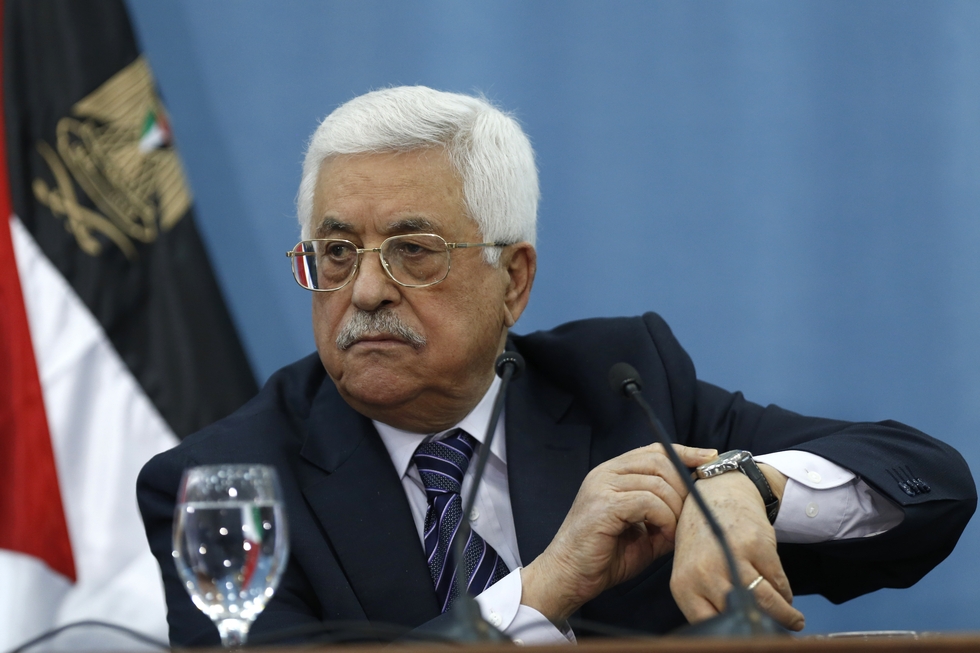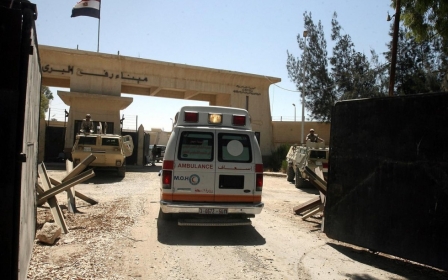The Ramallah paradox

A two-state solution to the Israeli-Palestinian conflict may be languishing on its death bed, but this does not mean it will be relegated to the obituary pages just yet.
While the likelihood of such a solution ever materialising under present conditions is close to nil, the idea itself remains very much alive, thanks in large part to the resilience of the Oslo paradigm that has framed US-led attempts to orchestrate a peace agreement since 1993. But while this status quo may suit Israelis, it has led Palestinians into a strategic dead-end.
For PLO leaders, the two-state solution remains as much a key tenant of faith as it does an existential question. Having invested all of their time and energy since 1988 towards the creation of a Palestinian state based on the 1967 Green Line, their fate along with that of the Palestinian institutions they helped build remains bound to the two-state solution and the reality the Oslo Accords have since created.
For all that President Abbas has occasionally threatened to hand in the keys to the Palestinian Authority, cancel security cooperation with Israel or otherwise annul the Oslo Accords themselves, doing so risks provoking a Palestinian tabula rasa that jeopardises what little Palestinians have achieved over the last two decades.
Yet it is also clear that the various strategies pursued by Palestinians have achieved little more than sustaining the very status quo they seek to escape. Far from resolving the conflict, the diplomatic process in its actual configuration has acted as a conflict management tool that has become the chief enforcer of the status quo. Nor have attempts to advance Palestinian recognition through multilateral fora been able to translate into full and effective non-recognition of settlement entities, or two decades of state-building efforts into real sovereignty.
While such failures are clear, elaborating a new Palestinian liberation strategy able to successfully challenge the status quo remains elusive, not least given the fragmented and unrepresentative nature of the current Palestinian leadership.
Under current circumstances, advancing down the road of a virtual Palestinian state may actually end up benefitting Israeli policies. It suits Israelis to have a Palestinian Authority able to effectively manage (and an international community willing to pay for) the occupation on its behalf. But most of all, obtaining purely symbolic acknowledgements of Palestinian statehood aspirations also keeps alive the idea of a two-state solution without actually bringing it closer to fruition, thereby helping re-inforce a reality that is beneficial to Israel.
Israel’s silent annexation of large swathes of Palestinian territory can only be sustained so long as the vision of two states remains alive. Maintaining even a wafer thin belief in such an outcome (based on a non-peace process) is a holding strategy that allows Israel to deflect the bulk of international pressure even as it prolongs and deepens a largely cost-free occupation.
This legal "twilight zone" between temporary occupation and full-blown annexation allows Israel to control those parts of the West Bank on which the bulk of Israeli settlers are located, without having to shoulder any financial, legal or moral responsibilities.
Removing this illusion would reveal the current one-state reality that already exists. Namely, a system that has created two distinct legal regimes for those living under Israeli jurisdiction in the occupied territories and effectively disenfranchises millions of non-Jewish residents from having a say in the government that is the ultimate arbiter of their fate.
Although Israel’s politicians have become increasingly outspoken in their rejection of a Palestinian state based on internationally accepted parameters, mirroring a similar trend amongst its public, most realise that swallowing the entirety of the Palestinian territories would be demographically indigestible given the "threat" a growing non-Jewish population would represent to Israel's Jewish character.
What many Israeli politicians are increasingly advocating is therefore not a binational Jewish state akin to President Rivlin’s vision, but rather something of a middle ground based on the formalisation of the current reality in which the bulk of Palestinians would be confined to self-governing cantons with varying degrees of autonomy – referred somewhat deceptively as unilateral disengagement.
Whether on the left or right, the guiding principle of "maximum land, minimum Arabs" has given way to a concerted policy of fragmentation and separation of Palestinians. Successive governments have quietly entrenched Israel’s hold over Area C – which represents 60 percent of the West Bank yet less than 10 percent of its inhabitants – by integrating the settlement as fully as possible into the socio-economic fabric of Green Line Israel.
This has been accompanied by a policy of expulsions and house demolitions designed to thin out Palestinian presence in both Area C and East Jerusalem (which Israel annexed following the 1967 war). At the same time, efforts to set adrift the Gaza Strip and its 1.8 million inhabitants from the rest of the Palestinian polities would further swing the demographic balance in Israel’s favour, making the rest of the territories more digestible for Israel.
After 50 years of controlling Palestinians, Israeli society has become hooked on settlements and occupation. Although such addiction has grown particularly acute under Prime Minister Netanyahu’s right-wing governments, it is the product of a more profound shift within Israeli society that has seen the political enfranchisement of the Greater Israel movement.
The corrupting influence of half a century of military occupation has also led to a rise in Israeli illiberalism, born in large part by efforts to stifle domestic opposition to the settlement enterprise. This has manifested itself most recently through attempts to undermine the judicial independence of Israel's High Court, vilify those sections of Israeli society that still actively oppose Israel's occupation policies, or cast Israel’s Arab citizens as a fifth column.
Having succeeded in normalising the occupation domestically and squeezing those Israeli voices critical of the occupation, the settler movement and its supporters have now set their sights further afield – whether seeking to impose a settler leader as ambassador to Brazil, initiating a stealth campaign in the US to defend Israeli settlements, or slandering the European settlement policy with unfounded accusations of anti-Semitism.
Faced with such a concerted onslaught, now more than ever it is important for the international community to continue to unequivocally and explicitly make the distinction between Israel and all territories occupied by Israel in 1967. This also means reconciling avowed support for a two-state solution with Western powers' legal obligation to ensure that relations with Israel in no way support its settlement enterprise, benefit from it, or otherwise facilitate the violation of Palestinian rights.
- Hugh Lovatt is the Israel/Palestine Project Coordinator for the Middle East and North Africa Programme of the European Council on Foreign Relations (ECFR). You can follow him on Twitter @h_lovatt
The views expressed in this article belong to the author and do not necessarily reflect the editorial policy of Middle East Eye.
Photo: Palestinian Authority President Mahmud Abbas checks the time during a meeting with journalists in the occupied West Bank city of Ramallah, on 23 January, 2016 (AFP).
New MEE newsletter: Jerusalem Dispatch
Sign up to get the latest insights and analysis on Israel-Palestine, alongside Turkey Unpacked and other MEE newsletters
Middle East Eye delivers independent and unrivalled coverage and analysis of the Middle East, North Africa and beyond. To learn more about republishing this content and the associated fees, please fill out this form. More about MEE can be found here.





